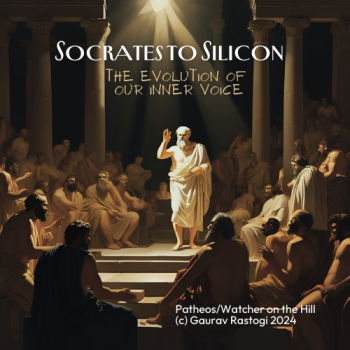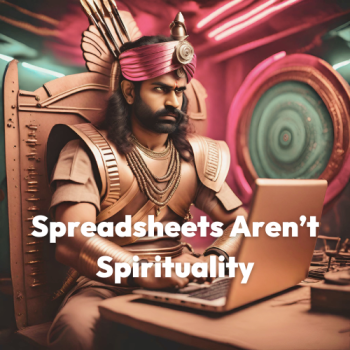Hope and dreams are the dollars and change of Silicon Valley. ‘Unicorns’ was the name derisively given to startup companies with a Billion Dollar valuation, because they are all too rare and mostly fictional, but not a day goes by these days before someone sights another Unicorn, and the sightings of ‘Deca’horns (companies with $10Bn+ valuation) now considered a common as the corner Starbucks.
Mass produced miracles.
(This note first appeared in print on India Currents).
—

In the Yoga system, there are things that are known, which we call gyaata, such as the time the Sun will rise tomorrow and that E = MC-squared. These are already known to science and open to scientific inquiry. Then there are things that are not known today, but will be known given enough time, which we call agyaata. Our knowledge is expanding every second, and every minute we know things that we never knew before. The known universe is knowable, in time, and our science knows no bounds, because we will continue to extend the outer edge of science forever.
But, there are limits; we will always have infinity. Even if we know all of infinity, another infinite will remain. Suppose you wanted to know the depth of an ocean and sent down a one mile rope, but it didn’t touch the bottom. You send a two mile rope, and find it’s still short. Then you send a billion mile rope and it still comes short. What you’ve learnt for sure is that the ocean is deeper than a billion miles. Maybe it’s just an inch more than that rope, or maybe another billion miles. You send forth an infinitely long rope, and find some still remains beneath.
There is something unknowable about this universe. This is what we know as agyeya, the unknowable. Science already stopped at gyaata + agyaata, the known + unknown. This is the mystery whose depths science does not plumb, and can not plumb, however hard and long one tries.
The real joy of life is in accepting this deep mystery. Knowing that this unknowable is not merely darkness past the edge of the knowable, but that it’s the light at the center of everything we see and act inside of. Even the most skilled machine maker cannot iron out this kink in the next iteration, because it’s at the heart of this playful existence.
A game where there is no end-game, but where the play-ing itself is.
This is the essential vitality of the dharmic thought that’s behind the eastern dharmas, especially Hinduism. It’s what we call as Lila, the playfulness. Once we accept the presence of this Lila, life itself takes a new turn. The joy lasts forever, giving it a freshness that doesn’t decay, and a surprise that doesn’t reveal. Now pass the chutney please.
—
As children we ask questions; only the children ask questions. That adults don’t ask questions anymore is not because we already know, but because we have learnt that questions are uncomfortable. We know that our answers are provisional and fragile, ready to crumble at the next ‘why’, and so we answer louder and firmer, so the children know better than to ask some more. There be dragons, so ask no more foolish questions.
The western thought pivots on the ideas of the infallibility of ‘Reason’, the primacy of science and the scientific method. All questions have answers that are known, or will be known in time. This gives the western thought a strong sense of being in control and being in-charge.
Western religion and businesses are both products of this very rational thought. Modern businesses are built on a foundation of science and predictability. The rules of economics are infallible, or at least will be infallible once the experts all agree on them. Surprises are to be avoided at all costs, and companies work with a carefully orchestrated drama of legal, commercial and practical insurance. A choreographed machinery is the ideal of the modern corporation; the big business machine thrives on predictability, on uniformity, on conformity.
A fully reasonable, predictable and conforming universe is fully deterministic. To keep both eyes on history, on a written book of rules, is to become a machine. The rules of physics are enforced with no exception, and we are just atomic or quantum bits bouncing around in a predictable machine computer. A clockwork universe has no space for fun, for joy, and for the sheer bliss of being.
—
But it’s self-evidently not the case. We know we are not machines because we experience joy, we crave fun, and we occasionally see flashes of bliss.
The Hindu religion is crazy that way. We have no definite answers, and no defining authorities to rely upon. You can follow Shankaracharya’s Advaita, or discard it. You could pray to the Elephant-headed god, or not. You could read the Bhagavad Gita for directions, or you could not. There are no set rules, but that doesn’t mean there’s chaos. There’s a dance with no rules, other than the improvisation that comes in gameplay. Call it the Lila of Krishna, or the dance of Shiva. All is improvised, all is play. The joy, bliss or ananda is not a residual vestige of poor design in this system, (the clock-maker’s kink to be removed in the next upgrade), but the seed and destiny of everything we see around. Everything vibrates to ananda.
—
The Silicon Valley is Hindu at heart, always seeking the next miracle in the spirit of playful discovery. Walmart growing 3% in revenues is the result of a plan, but WhatsApp getting 600 million users is just a miracle.
The Silicon Valley lives because it loves a good mystery. Quit my cushy job to pursue a nebulous startup dream? Sign me up right now. Read Sci-fi books and dream of making these gizmos come to life? Come here, brother, and we will make something together. But who embraces mystery? The misfits, the crazy ones, the ones who do. The fathers of this Valley gave us the aphorism a couple generations ago: they said, “Stay Hungry, Stay Foolish”. Staying foolish means to accept the limits of our knowledge, and to accept the mystery readily. Is that crazy, or what?
—
In every temple of Shirdi Saibaba, a 19th century Hindu-Muslim mystic, there are inscriptions to the right and left of the Baba’s statue. To the left, it says, Shraddha and the right says Saburi. Saburi means to be patient and waitful, and Shraddha means to trust, to believe, and to have faith. But these poor English translations trivialize the powerful act. Shraddha is the mantra that echoes through this valley. It really means to act with courage, to act in a way that doesn’t worry about whether the action will lead to results and wealth, but to act because you know no other way to live. To leap. Not to leap while knowing that there will be a landing spot at the end of that jump. Not to leap while not knowing what’s at the other end of that jump. To leap because that’s the only way you know to live.
Isn’t that the heart of the entrepreneurial fervor in the Silicon Valley? A leap into the unknowable. A joyous, Thelma and Louise leap into the glorious unknowable.
How Hindu!?
Here’s to Steve Jobs, who was the soundtrack for this ode to the crazy ones.
“
Here’s to the crazy ones. The misfits. The rebels. The troublemakers. The round pegs in the square holes. The ones who see things differently. They’re not fond of rules. And they have no respect for the status quo. You can quote them, disagree with them, glorify or vilify them. About the only thing you can’t do is ignore them. Because they change things. They push the human race forward. And while some may see them as the crazy ones, we see genius. Because the people who are crazy enough to think they can change the world, are the ones who do.
”
—
Gaurav Rastogi contemplates The Mystery while talking an afternoon walk by the San Francisco Bay near his office. He plots a spiritual revolution and seeks others that walk this way. He tweets @alpharust and his professional bio is on LinkedIn.
















